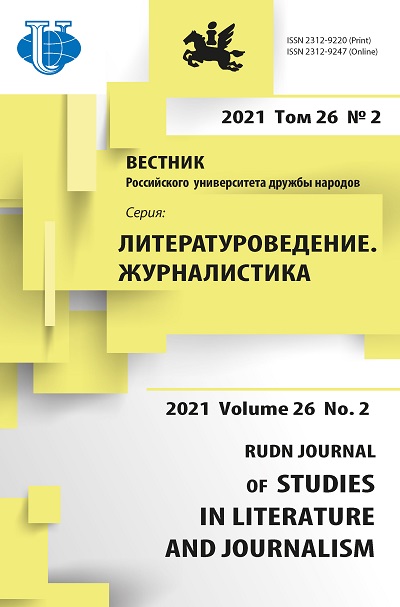Исход шайеннов и линчевание негров: рецепция исторических романов Говарда Фаста в СССР
- Авторы: Щербинина О.И.1
-
Учреждения:
- Московский государственный университет имени М.В. Ломоносова
- Выпуск: Том 26, № 2 (2021)
- Страницы: 217-226
- Раздел: Литературоведение
- URL: https://journals.rudn.ru/literary-criticism/article/view/26937
- DOI: https://doi.org/10.22363/2312-9220-2021-26-2-217-226
- ID: 26937
Цитировать
Полный текст
Аннотация
Исследуется рецепция исторических романов Говарда Фаста (популярного в 1950-е гг. автора, прошедшего путь от лояльного СССР члена КП США до «врага» коммунизма в его советском изводе) в Советском Союзе. Анализ американского контекста помогает проследить, почему автор левых убеждений обратился к жанру исторического романа и с какой спецификой литературного рынка он столкнулся. Краткий обзор советских рецензий позволяет продемонстрировать, что романы «Последняя граница» и «Дорога свободы» воспринимались советскими литературоведами как протест Фаста против расовой дискриминации и растущего могущества правых сил. Особенную актуальность данные проблемы приобретали на фоне маккартистской кампании - ее жертвой Фаст стал в 1947 г. О степени популярности писателя в Советском Союзе свидетельствуют и инсценировки его романа «Дорога свободы» на сцене московских театров, анализ которых приводится в статье. Рецензируя «Последнюю границу» и «Дорогу свободы», советские литературоведы отмечали, что отсутствие «декадентского» примитивизма выделяло Фаста среди других некогда дружественных СССР писателей, таких как, например, Ричард Райт и Клод Маккей. В рамках этой традиции критики экзотизма, берущей свое начало в 1920-1930-е гг., романы, в которых шла речь о далеких краях, имели ценность только тогда, когда этнографические описания использовались для последовательного социального критицизма. Сам Фаст, поддерживая разработанную в Советском Союзе концепцию «искусство как оружие», также рассматривал утрированную экзотику, пышную декоративность исторических романов как примету эскапистской литературы, которая игнорирует метод диалектического материализма.
Об авторах
Ольга Ивановна Щербинина
Московский государственный университет имени М.В. Ломоносова
Автор, ответственный за переписку.
Email: olga-scherbinina24@mail.ru
аспирант, кафедра истории зарубежной литературы, филологический факультет
Российская Федерация, 119991, Москва, Ленинские горы, д. 1Список литературы
- Грибачев Н. Говард Фаст - псаломщик ревизионизма // Литературная газета. 1958, 30 января.
- Deery P. Red apple: Communism and McCarthyism in Cold War New York. New York: Fordham University Press, 2014.
- Sorin G. Howard Fast: life and literature in the left lane. Bloomington: Indiana University Press, 2012.
- Foley B. Radical representations: politics and form in the US proletarian fiction, 1929-1941. Durham - London: Duke University Press, 1994. P. 459.
- Lindsay J. The historical novel // New Masses. 1937, January 12. Pp. 15-16.
- Sillen S. History and fiction // New Masses. 1938, June 14. Pp. 22-23.
- Fast H. History in fiction // New Masses. 1944, January 18. Pp. 7-9.
- Fast H. Realism and the Soviet novel // New Masses. 1945, December 11. Pp. 15-16.
- Елистратова А. Говард Фаст // Прогрессивная литература стран капитализма в борьбе за мир. М.: Изд-во Акад. наук СССР, 1952. С. 192-237.
- Романова Е. Говард Фаст // Прогрессивная литература стран капитализма. М.: Изд-во Акад. наук СССР, 1952. С. 308-326.
- Дубашинский И. Говард Фаст // Современная прогрессивная литература зарубежных стран в борьбе за мир. М.: Изд-во Московского университета, 1954.
- La Farge O. The Last Frontier, by Howard Fast // The Saturday Review. 1945, July 26.
- Hyatt C. The Cheyenne struggle // New Masses. 1942, March 17. P. 24.
- Фаст Г. Как я был красным. URL: https://royallib.com/get/fb2/fast_govard/kak_ya_ bil_krasnim.zip (дата обращения: 21.02.2021).
- Fast H. The negro finds his story // New Masses. 1945, May 15. P. 17.
- Fast H. A method for tolerance // Harper’s Bazaar. 1944, July.
- Fast H. Proud to be black // Negro Digest. 1945, March.
- Галанов Б. Дорога свободы Гидеона Джексона // Знамя. 1949. № 11. С. 189-192.
- Мендельсон М. Гидеон Джексон и другие // Новый мир. 1947. № 5. С. 150-167.
- Сутоцкий С. Дорога свободы // Советское искусство. 1951, 21 ноября.
- Афанасьев Р. На пути к высокой героике // Советское искусство. 1952, 7 июня.
- Абрамов Ал. Роман и его инсценировки // Театр. 1952. № 7. С. 55-66.
- Медовар Л. Героизм духа, умножающий свет // Лехаим. 2002. № 1 (117). URL: https://lechaim.ru/ARHIV/117/medovar.htm (дата обращения: 21.02.2021).
- Friedman R. Review on my glorious brothers // Daily Worker. 1948, October.
Дополнительные файлы















